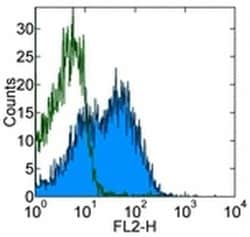Learn More
Invitrogen™ Ly-108 Monoclonal Antibody (eBio13G3-19D (13G3-19D)), Functional Grade, eBioscience™
Mouse Monoclonal Antibody
Supplier: Invitrogen™ 16150882

Description
Description: The eBio13G3-19D monoclonal antibody reacts with mouse Ly108, the mouse homologue of human SLAMF6 (signaling lymphocyte activation molecule family member 6). Mouse Ly108 is also known as NTB-A (NK cell, T cell, B cell antigen), and is expressed on NK, T cells, and B cells. Engagement of the Ly108 receptor enhances NK cell activity and expression of IFN-gamma, and contributes to the inability of NK cells to kill Epstein Barr virus-infected B cells in X-linked lymphoproliferative disease. CD4+ T cells from Ly108 knock-out mice exhibit diminished ability to produce IL-4 and defective neutrophil functions. Staining has not revealed any strain differences between C57BL/6 and BALB/c mice. Other strains have not been tested. Applications Reported: This eBio13G3-19D (13G3-19D) antibody has been reported for use in flow cytometric analysis, immunoprecipitation, and immunoblotting (WB). Applications Tested: This eBio13G3-19D (13G3-19D) antibody has been tested by flow cytometric analysis of mouse splenocytes and thymocytes. This can be used at less than or equal to 0.5 μg per test. A test is defined as the amount (μg) of antibody that will stain a cell sample in a final volume of 100 μL. Cell number should be determined empirically but can range from 10^5 to 10^8 cells/test. It is recommended that the antibody be carefully titrated for optimal performance in the assay of interest. Storage and handling: Use in a sterile environment. Filtration: 0.2 μm post...
Ly108, the mouse homologue of human SLAMF6 (signaling lymphocyte activation molecule family member 6), is expressed on NK cells, B cells, and T cells. Engagement of the Ly108 receptor enhances NK cell activity and increases the expression of IFN-gamma. This receptor plays a role in the inability of NK cells to kill Epstein Barr virus-infected B cells in X-linked lymphoproliferative disease. In Ly108 knock-out mice, CD4+ T cells show a diminished ability to produce IL-4 and exhibit defective neutrophil functions, indicating the importance of Ly108 in immune regulation and cellular function. Overall, Ly108 is crucial for modulating immune responses and maintaining effective immune cell activity.
Specifications
| Ly-108 | |
| Monoclonal | |
| 1 mg/mL | |
| PBS with no preservative; pH 7.2 | |
| Q9ET39 | |
| SLAMF6 | |
| Affinity chromatography | |
| RUO | |
| 30925 | |
| 4°C | |
| Liquid |
| Flow Cytometry, Functional Assay, Immunoprecipitation, Western Blot | |
| eBio13G3-19D (13G3-19D) | |
| Functional Grade | |
| SLAMF6 | |
| Activating NK receptor; CD352; KAL1; KAL1b; KALI; KALIb; Ly108; Lymphocyte antigen 108; natural killer-, T- and B-cell antigen; NK-T-B-antigen; NTBA; NTB-A; NTBA receptor; RGD1561848; SF2000; SLAM family member 6; Slamf6; UNQ6123/PRO20080 | |
| Mouse | |
| 100 μg | |
| Primary | |
| Mouse | |
| Antibody | |
| IgG2a κ |
The Fisher Scientific Encompass Program offers items which are not part of our distribution portfolio. These products typically do not have pictures or detailed descriptions. However, we are committed to improving your shopping experience. Please use the form below to provide feedback related to the content on this product.

